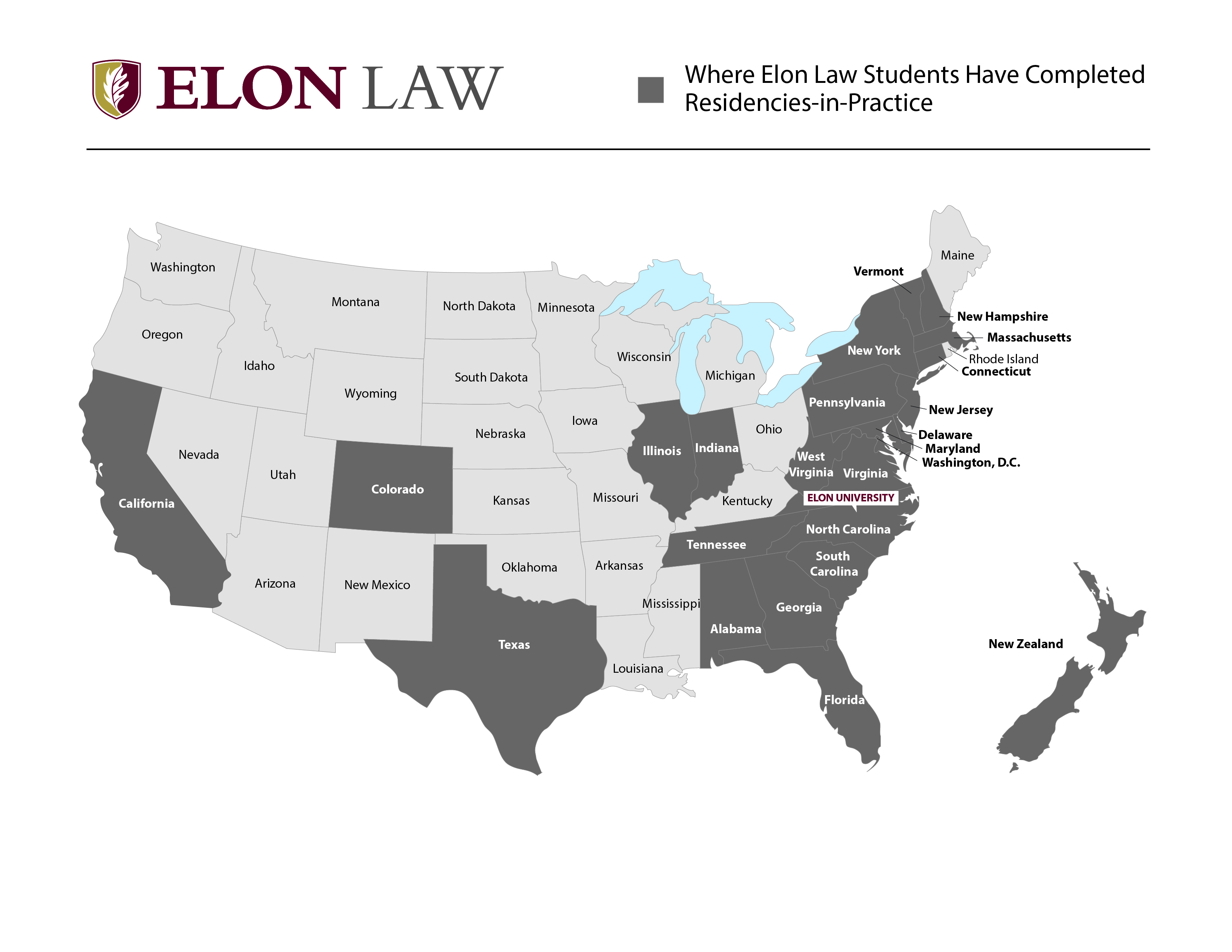Our Residency-In-Practice Program
 A cornerstone of real-world legal learning
A cornerstone of real-world legal learning
Elon Law’s curriculum requires every second-year student to complete a full-time, course-connected residency-in-practice, the most immersive of the law school’s hands-on learning experiences. Through faculty-directed residencies, Elon Law students cultivate essential skills, values and judgment to help them excel as attorneys and deepen their understanding of various practice areas, while enabling attorneys to convey wisdom about the legal profession.
Bridging the divide between the legal academy and the practicing bar
Residencies create the opportunity for partnerships between Elon Law and the practicing bar and bench, unlike any working relationship in the profession. Judges and lawyers shape the future of the profession of law as students learn about the ethics, professionalism, knowledge, skill and judgment essential to the profession’s relevance and effectiveness.
In Residency, second-year law students work 32-36 hours a week over a 10-week trimester with their judge or attorney supervisor and a faculty member to create and implement a learning plan that develops an increased proficiency in professional legal skills and in an area of law practice. Learn more about Residency-in-Practice Program experiences from our students.
Important information for current students & prospective residency hosts
STUDENTS: Familiarize yourself with residency placement information that includes details on credit hours for current 2Ls and the match process (with links to forms) for 1Ls starting to plan for the upcoming academic year.
JUDGES & ATTORNEYS: Express interest here in becoming a residency supervisor and help shape the future of the profession of law.
Judicial Residencies
Corporate Residencies
Government and Public Interest Residencies
Clinic Residencies
Reflections on the Importance of Experiential Learning
 “In today’s world of law practice, it’s essential that attorneys, legal organizations and law schools collaborate in the professional preparation of new lawyers. The clients and communities we serve expect and deserve seasoned legal counsel, even from junior attorneys. Law students can cultivate expertise through in-depth, on-the-job training, interwoven with the study of law and other skill building experiences in law school. Students can benefit a great deal from the insight and guidance of accomplished attorneys. I’m excited about the possibility of shifting our profession’s approach to new lawyer development. We just need to work together to make it happen.”
“In today’s world of law practice, it’s essential that attorneys, legal organizations and law schools collaborate in the professional preparation of new lawyers. The clients and communities we serve expect and deserve seasoned legal counsel, even from junior attorneys. Law students can cultivate expertise through in-depth, on-the-job training, interwoven with the study of law and other skill building experiences in law school. Students can benefit a great deal from the insight and guidance of accomplished attorneys. I’m excited about the possibility of shifting our profession’s approach to new lawyer development. We just need to work together to make it happen.”
– Afi Johnson-Parris, former president, Greensboro Bar Association, attorney, Johnson-Parris Law, PLLC, Greensboro, N.C.
 “The immersive work placements I experienced as an Elon Law student proved tremendously helpful in my legal education and professional development. They provided me with important connections and deep insight into the practice of law. Elon Law’s residency program goes further. It presents an opportunity for lawyers to take a direct role in shaping the future of the profession. It is an important new avenue to cultivate values, judgment and skills in new attorneys, so that they can provide insightful counsel in a rapidly changing business environment.”
“The immersive work placements I experienced as an Elon Law student proved tremendously helpful in my legal education and professional development. They provided me with important connections and deep insight into the practice of law. Elon Law’s residency program goes further. It presents an opportunity for lawyers to take a direct role in shaping the future of the profession. It is an important new avenue to cultivate values, judgment and skills in new attorneys, so that they can provide insightful counsel in a rapidly changing business environment.”
– Nathan Standley L’11, vice president / associate general counsel, State Employees’ Credit Union, Raleigh, N.C.
 “Elon Law prepared me for success because my legal education did not end at legal theory. Elon Law went a step further, teaching the practical application of the law and showing me how to use my skills to serve clients and the community. Through residency experiences Elon Law students will become prepared to meet today’s expectations for lawyers, to be not just legal experts but also professional problem solvers who can provide economical and practical solutions for their clients.”
“Elon Law prepared me for success because my legal education did not end at legal theory. Elon Law went a step further, teaching the practical application of the law and showing me how to use my skills to serve clients and the community. Through residency experiences Elon Law students will become prepared to meet today’s expectations for lawyers, to be not just legal experts but also professional problem solvers who can provide economical and practical solutions for their clients.”
– Rachael Dimont L’10, attorney professional liability litigation, LabCorps, Burlington, N.C.
Questions about Elon Law’s residency-in-practice program? Contact Associate Professor Katherene Conner, Director of Residencies at Elon Law, at kconner2@elon.edu or 336-279-9311, 201 N. Greene Street, Greensboro, NC, 27401.